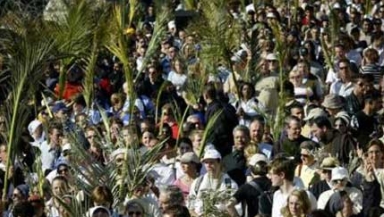
Going to church or wearing religious clothes like a cross around your neck make you more popular.
It also makes you seem trustworthy, according to a leading academic.
Eleanor Power, evolutionary anthropologist and Omidyar Postdoctoral Fellow at the Santa Fe Institute, says she lives in New Mexico and each year knows that Holy Week is approaching because she starts to see pilgrims carrying crosses on the highway.
Writing for the Evolution Institute, she says: 'Tens of thousands make the journey each year, fulfilling vows and seeking blessings at the pilgrimage site.'
One year, she joined in the pilgrimage for the last few miles and returned home with sore feet and tired muscles.
She says she reflects that the pilgrims have a strength she lacks and are driven forward by their faith. 'With just a fleeting glimpse, I am apparently ready to infer all sorts of qualities and characteristics about the blur of pilgrims I pass.'
Academic research shows that people often use religious action, such as pilgrimages, to infer something about the character and commitments of others.
'Experimental studies have found, for example, that we see people as more trustworthy if they show signs of membership to a religious community (say, a necklace with a cross), or adhere to religious dietary requirements (say, eating halal). Only those who are truly committed to the religious group and its beliefs, we seem to reason, will be willing to make such investments. They must be trustworthy.'
She investigated her theory by going to live in South India for two years among villages with Hindus, Catholics and Protestants.
My studying people's religious practice and how others viewed them, she found that those who worship regularly at a church or temple and those who undertake dramatic acts of devotion were seen by their peers as more devout.
'But even more was being associated with such religious villagers: they were also seen as having a good work ethic, giving good advice, being generous, and having good character.
'A whole suite of other-focused, prosocial qualities was being attributed to those villagers who invested in the religious life of their village.'
The villagers paid 'particular attention' to the religious action of young people, whom they were still trying to suss out, she writes. 'Those very things that can make religion seem particularly inscrutable for some may actually be what make it such an enduring and resilient part of the cultures of the world.'













